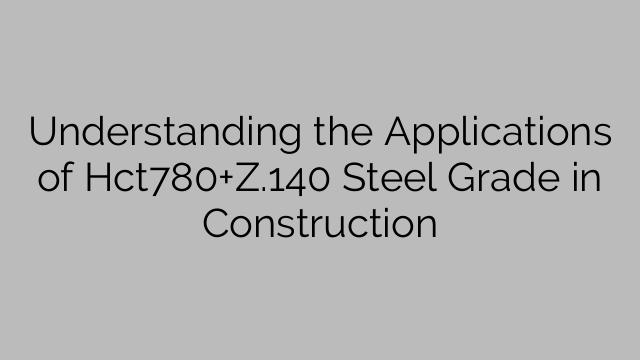Understanding the Applications of Hct780+Z.140 Steel Grade in Construction
Steel is an essential material in construction, and its different grades offer varying properties and strengths. One such grade that is gaining attention in the construction industry is Hct780+Z.140. This high-strength steel grade has unique properties that make it suitable for a wide range of construction applications.
Hct780+Z.140 steel grade belongs to the high-strength low-alloy (HSLA) steel family, which is known for its excellent strength-to-weight ratio and high tensile strength. The “Hct” in the grade name stands for high-strength complex-phase, while “780” represents the minimum yield strength in megapascals (MPa). The “Z.140” indicates the coating weight of the zinc layer, which is an important factor in ensuring corrosion resistance.
One of the main applications of Hct780+Z.140 steel grade in construction is in the manufacturing of structural components such as beams, columns, and trusses. Its high strength allows for the construction of lighter and more efficient structures, reducing the overall material usage and construction costs. Additionally, its excellent formability makes it easier to fabricate into complex shapes, allowing for versatile and innovative designs.
Another important application of Hct780+Z.140 steel grade is in the production of building envelopes, such as roofing and cladding systems. The steel’s high corrosion resistance, particularly due to the zinc coating, ensures that the building envelope is durable and long-lasting, even in harsh environmental conditions. Additionally, its high strength and formability allow for the production of large-span roofing systems, reducing the need for excessive structural support.
In addition to structural and building envelope applications, Hct780+Z.140 steel grade is also suitable for use in the construction of transportation infrastructure, such as bridges and highways. Its high strength and excellent fatigue resistance make it a preferred material for the construction of long-span bridges and highway structures, where durability and minimal maintenance are critical factors.
Furthermore, Hct780+Z.140 steel grade is also finding applications in the construction of energy infrastructure, such as power plants and renewable energy facilities. Its high strength and corrosion resistance make it ideal for the construction of infrastructure in challenging environments, such as offshore wind farms and solar power plants.
In conclusion, Hct780+Z.140 steel grade offers a versatile and high-performance solution for various construction applications. Its unique combination of high strength, formability, and corrosion resistance makes it an ideal material for structural components, building envelopes, transportation infrastructure, and energy facilities. As the construction industry continues to evolve, the use of high-strength steel grades like Hct780+Z.140 will likely become more prevalent, driving innovation and efficiency in construction practices.

